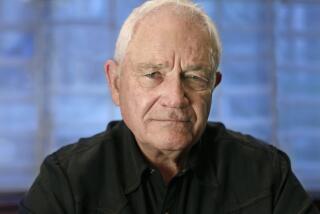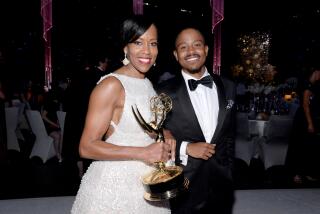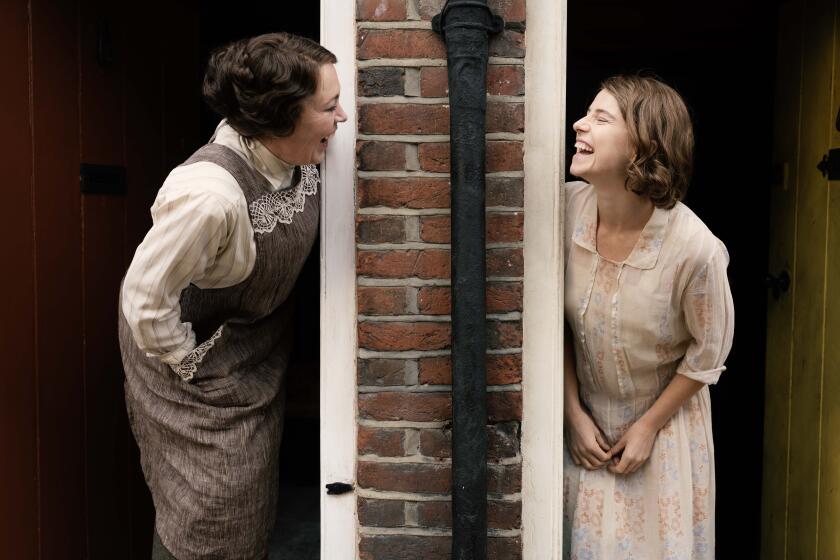Perspective: How true is ‘The King’s Speech’?
- Show more sharing options
- Copy Link URL Copied!
If any best-picture contender was going to face questions about taking liberties with the facts this Oscar season, it seemed likely it would be “The Social Network.” But now that screenwriter Aaron Sorkin and Facebook founder Mark Zuckerberg have tactfully retreated a bit from their initially contentious stands, the accuracy debate has shifted to “The King’s Speech.”
“The King’s Speech” is being sold as a feel-good tale of how a friendship between a royal and a commoner affected the course of history. But some commentators are complaining, among other things, that the film covers up Winston Churchill’s support for Edward VIII, the playboy king who abdicated to marry an American divorcee, and that the movie fails to acknowledge that the once tongue-tied George VI supported Prime Minister Neville Chamberlain’s appeasement of the Nazis. (Writing last month at slate.com, Christopher Hitchens blasted the film as “a gross falsification of history.”)
As a specialist in British history, I agree that screenwriter David Seidler certainly has tweaked the record a bit and telescoped events in “The King’s Speech” — but for the same artistic reasons that have guided writers from Shakespeare to Alan Bennett, who wrote the screenplay for “The Madness of King George” (and the play on which the movie was based). While historians must stick to the facts, dramatists need to tell a good story in good time. It also helps if they can explore the human condition in the process.
Seidler’s script opens with Colin Firth as Prince Albert (the future King George VI, but then the Duke of York and known to his family as “Bertie”) facing the ordeal of making his first radio broadcast. To add to the strain, the duke must deliver the address in a stadium before a large crowd. However, his words come only haltingly, causing embarrassment for all present. Not shown but later referenced in the film is the fact that in the crowd was Lionel Logue (Geoffrey Rush), a speech therapist recently transplanted from Australia.
All this took place in 1925, but Seidler brings the speech disaster forward 10 years to the eve of the abdication crisis, which resulted in the duke unexpectedly being transformed into a king when his brother Edward VIII stepped aside. The compression of events, although understandable, requires a slew of historical alterations to explain the back story.
The duke’s stammer derived in part from the verbal abuse he received as a child from his father, King George V (Michael Gambon). To indicate this, Seidler concocts a scene showing the adult Bertie still being hectored by his father, and it is only after this that he agrees to see Logue.
Much of the early part of the film is taken up with Logue’s struggle to win the duke’s trust. The therapist succeeds partly by trickery and partly because of continued prompting by Bertie’s wife, the Duchess of York (Helena Bonham Carter). After achieving a “breakthrough” with his patient and following Edward’s abdication in 1936, Logue helps prepare the new king for the ordeal of the coronation ceremony. That hurdle cleared, the film culminates with the therapist coaching Bertie through another historic moment: his broadcast to the British Empire at the start of World War II with an approving Churchill (Timothy Spall) looking on.
In reality, the duke first sought treatment from Logue in 1926, and, contrary to the film, the two hit it off immediately. Logue wrote in a note later published in the king’s official biography that Bertie left their first meeting brimming with confidence. After just two months of treatment, the duke’s improvement was significant enough for him to begin making successful royal tours with all the public speaking that entailed. George V was so delighted that Bertie rapidly became his favored son and preferred heir.
In interviews, Seidler has been ambiguous about what sources he consulted in writing the script. The various biographies of George VI all tell of the king’s relationship with Logue. This includes the official biography published in 1958. John Wheeler-Bennett, the royal biographer personally selected by the king’s widow, was himself a former patient of Logue’s and so wrote about the episode with great emotion.
It remains unclear, though, to what extent sources not available to scholars or the public played a role in the final shape of the film. Seidler has said that Logue’s son offered 30 years ago to show him his father’s notebooks, provided the king’s widow agreed. But when Seidler wrote Queen Elizabeth, the Queen Mother, he was told that she found it too painful to remember the old anguish and begged that he wait until she had passed away.
Although the Queen Mother died in 2002, filmmakers said they were provided with Logue’s diaries, notes and letters only shortly before filming began. Seidler has not specified how material from Logue’s records was used, but he has said that research guided him to the conclusion that Logue utilized Freud’s “talking cure” approach. Thus, by reading up on the king’s life, Seidler used what he terms “informed imagination” to create the film’s therapy scenes.
Seidler also drew on personal experience: He himself stammered as a child, and it was this that led him to an interest in George VI. From what he has said about his own successful treatment, Seidler indicates that he projected that experience into his fabrication about Logue having to work patiently to gain Bertie’s trust. This liberty with the truth certainly gives the film more dramatic interest.
There are many other instances of artistic license in “The King’s Speech.” For example, Bertie chose his regal cognomen, George, out of respect for his father and not as the film has it because Churchill suggested that Albert sounded “too German.” Another dramatic fantasy occurs when the Archbishop of Canterbury (Derek Jacobi) breathlessly revealed that Logue was not in fact a doctor. In reality, Logue’s credentials were never misrepresented. Bertie always referred to him as “Mr. Logue” or simply “Logue.” Logue’s grandchildren recently came forward to say that their grandfather never used Christian names with the king at all — despite the movie making a strong point that the future king bristled at being called “Bertie” by Logue.
As for Hitchens’ allegations, they are much ado about nothing. Churchill’s support of Edward VIII owed more to his near-medieval reverence for the monarchy than it did to the individual occupying the throne. In supporting the appeasement policies of Chamberlain, George VI acted in harmony with the overwhelming majority of the British population across the political spectrum. As a combat veteran of World War I, the king was as anxious as his subjects to avoid a second conflict by any promising means. George VI was also at one with most Britons in remaining skeptical about Churchill as prime minister until the great man had proved himself.
Hitchens will get a second chance to scrutinize moviedom’s portrayal of Edward VIII and George VI this year, when Madonna’s film “W.E.” — about Wallis Simpson and Edward — hits theaters. He’s probably already stocking up on pencils.
Freeman teaches history at California State Fullerton.

More to Read

Kate’s remarkable video was a Royal revolution, scepter-spinning in its frankness
March 24, 2024

David Seidler, ‘The King’s Speech’ screenwriter, dies at 86
March 17, 2024

Regina King says son Ian is ‘always with me,’ breaking her silence two years after his death
March 14, 2024
The biggest entertainment stories
Get our big stories about Hollywood, film, television, music, arts, culture and more right in your inbox as soon as they publish.
You may occasionally receive promotional content from the Los Angeles Times.
More From the Los Angeles Times


Review: In ‘Wicked Little Letters,’ the shock value feels about a century too late

Review: In the cryptic ‘The Shadowless Tower,’ connection is stymied by a murky past

Review: ‘In the Land of Saints and Sinners,’ where Liam Neeson once again has his vengeance

Review: In ‘Femme,’ a secret act of vengeance comes disguised as erotic flirtation
March 30, 2024
Truth and Fiction in ‘The King’s Speech’
Historians and critics charge that George VI was a nitwit and a Nazi appeaser
On the heels of its 12 Academy Award nominations , “The King’s Speech,” an inspiring story of King George VI and his triumph over stuttering, is being criticized for historical inaccuracies.
It’s as predictable as the Oscars themselves. A new front-runner often means some fresh round of attacks, and the charge of historical distortion is a perennial one.
In this case, intellectual gadfly Christopher Hitchens and the New York Review of Books’ Martin Filler are charging that the monarch in question was no better than a Nazi appeaser and, in Filler’s words, “a nitwit.” They paint a portrait of the wartime king that is far different from the shy family man essayed by Oscar nominee (and favorite) Colin Firth.
“‘The King's Speech’ …perpetrates a gross falsification of history,” Hitchens wrote on Slate on Monday, saying the king was not worthy of hagiography. Fillers says the king had an uncontrollable temper and even struck his wife.
But Hugo Vickers, a historian who consulted on the film and author of a biography on the Queen Mother, disagreed: “He was a humble man and a courageous man and he was called upon to do a job for which he had not been trained,” he told TheWrap.
He said the depiction of a man struggling to overcome a crippling speech impediment is accurate.

The filmmakers themselves declined to comment, but have said publicly that the movie was carefully researched.
The appeasement charge stems from the king’s decision to pose with Neville Chamberlain on the balcony of Buckingham Palace after the prime minister negotiated the Munich Agreement with Hitler in 1938 (a fact that the movie skirts over).
Whether George VI’s evolving views of the threat of Nazism should be defined solely by that photo-op with Chamberlain are at the heart of the current debate. Historians and journalists sympathetic to the film say the criticism is overly simplistic.
When war came, King George VI and his wife bravely remained in London even as the blitzkrieg raged. It was his brother, Edward, they say, who was known to have Nazi sympathies, while the king eventually rallied the country – as the film depicts – to meet the threat of war.
And anyway, they add, the film is about stuttering, and not wartime politics.

Filler goes further than the acerbic Hitchens, emphasizing George VI’s personal deficits as much as the king’s leadership deficiencies.
“‘The King’s Speech’ doesn’t dwell on George’s limited intellectual capacities, but many who dealt first-hand with him did,” Filler wrote in the New York Review of Books .
For journalists such as Harold Evans, who reminisces about a wartime George VI in his book “My Paper Chase: True Stories of Vanished Times,” Hitchens and Filler misinterpret the king’s legacy. He also maintains that Hitchens’ anti-monarchist beliefs have colored the social critic’s view of history.
“It is hard for Americans to understand the atmosphere in England in the thirties. Everyone had lost a cousin or had a relative killed in World War I. They were horrified that we’d go back to war again,” Evans told TheWrap.
“It’s not a film about appeasement. It’s a film about the struggle of a man to overcome a great handicap,” he added.

Or is it just about Oscar politics?
Among Oscar campaigners, the articles by Hitchens and Filler are suspiciously timed – coming directly after the Weinstein Company film dominated the Oscar nominations, which followed an upset win at the Producers Guild Awards on Saturday.
For months critics have harped that “The Social Network” gets the story of Facebook’s founding gravely wrong.
Complaints about Hollywood biopics playing fast and loose with the facts are a staple of Oscar races (and are often gleefully passed along by rival films’ camps), and this season is shaping up to be no different.
In the case of “Network,” critics have chirped that the David Fincher overstates the importance of Harvard eating clubs to Mark Zuckerberg and the seminal role a painful breakup played in the creation of Facebook.

Last week at a Digital Life Design conference in Munich, Sean Parker, the Napster co-founder and Facebook executive played by Justin Timberlake in the movie, “a complete work of fiction.”
In his Golden Globes acceptance speech, “Network” screenwriter Aaron Sorkin seemed to answer those critiques by saying he was using Zuckerberg as a metaphor.
In past years, Oscar candidates such as “A Beautiful Mind,” “Saving Private Ryan” and “The Queen” have been similarly bedevilled by charges of inaccuracy.
Nor are these the first times that the portrait of King George VI painted in “The King’s Speech” has been called into question.
Just days after the film began its limited release, Andrew Roberts in The Daily Beast , griped about the “…very many glaring and egregious inaccuracies and tired old myths that this otherwise charming film unquestioningly regurgitates.”

However, this latest set of slams are particularly trenchant.
In addition to griping about George VI’s wartime leadership, Filler and Hitchens contend that the movie misrepresents the relationship between Winston Churchill and the monarch. In the film, Churchill is depicted as pushing for the abdication of Edward VIII, so that the king can marry American divorcee Wallis Simpson.
In reality, Churchill fiercely opposed the decision, and his support for Edward VIII initially led to a frosty relationship with his successor.
Splitting hairs, say those who endorse the film’s version of history.
“If this were a documentary, rather than a theatrical release, I’d be the first to complain,” Evans said, adding, “I feel irritated by this attempt to make a political point with something that is an inspirational film.”


IMAGES
COMMENTS
Seidler’s script opens with Colin Firth as Prince Albert (the future King George VI, but then the Duke of York and known to his family as “Bertie”) facing the ordeal of making his first ...
On the heels of its 12 Academy Award nominations, “The King’s Speech,” an inspiring story of King George VI and his triumph over stuttering, is being criticized for historical inaccuracies.